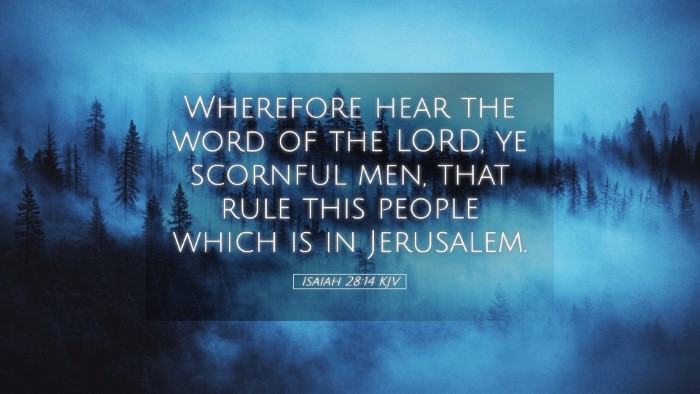Commentary on Isaiah 28:14
Isaiah 28:14 states:
"Wherefore hear the word of the Lord, ye scornful men, that rule this people which is in Jerusalem."
This verse serves as a powerful call to the leaders of Jerusalem – those who mock and dismiss the prophetic warnings from God. Below is a summary of insights derived from public domain commentaries, examining the theological and moral implications of this verse.
Contextual Background
The Book of Isaiah is rich in prophetic literature, addressing the nation of Judah during a time of impending judgment and moral decay. In this chapter, God is delivering a message to the leaders who are not only failing in their duty to shepherd the people but are actively engaging in scorn and disbelief. Understanding this context is crucial for interpreting the intended message.
Insights from Matthew Henry
Matthew Henry emphasizes the gravity of the message directed toward the "scornful men." He interprets this term as referring to those in positions of authority who display a dismissive attitude towards God's word. Henry remarks on the consequences of such arrogance:
- The Price of Scorn: Those who scorn divine warnings put themselves in peril, for they disregard the serious nature of God’s messages.
- The Responsibility of Leaders: Leaders are admonished to heed God's word, highlighting their responsibility to lead faithfully rather than fall into mockery.
Insights from Albert Barnes
Albert Barnes offers a theological reflection on the nature of God's address to the rulers of Jerusalem. He highlights:
- The Divine Rebuke: Barnes notes that God's address is both a rebuke and an invitation to repentance. It signifies God's patience and His desire for leaders to return to righteousness.
- Implications for the People: The scornful attitude of leaders inevitably trickles down, impacting the populace who look to them for guidance and stability.
Insights from Adam Clarke
Adam Clarke provides a detailed exposition on the intent of God's declaration through Isaiah. His analysis includes:
- The Call to Attention: Clarke asserts that the phrase "hear the word of the Lord" is both a summoning and a command, urging leaders to pay heed to the divine counsel.
- Covenantal Responsibility: Drawing from the covenant context, Clarke emphasizes that those who hold authority are under a divine obligation to uphold God's laws and lead the people accordingly.
Theological Themes
In considering Isaiah 28:14, several overarching theological themes emerge:
- Judgment and Mercy: The verse encapsulates a dual theme of judgment against the scornful and mercy in the form of a warning, showcasing God’s desire for repentance.
- Authority and Accountability: The text presents the idea that authority brings accountability, and leaders must recognize the weight of their influence on the lives of those they govern.
- The Importance of Prophetic Voice: The call to "hear" underscores the crucial role of prophetic voices in guiding and correcting a wayward people.
Practical Applications for Today
For pastors, students, and theologians, Isaiah 28:14 offers significant lessons:
- Leadership Integrity: Reflect on the moral integrity required in leadership positions today—whether ecclesiastical or secular—and the need for humility before God’s word.
- Heeding God’s Warnings: The importance of being receptive to divine instruction, particularly in contexts where cynicism and skepticism may prevail.
- Community Influence: A reminder of the broader impact that leaders can have on their communities and the ethical imperative to guide with Godly wisdom.
Conclusion
In conclusion, Isaiah 28:14 serves as a poignant reminder of the seriousness of spiritual leadership and the expectations God has for those in authority. It conveys the timeless truth that mocking God’s word leads to peril, while heeding His counsel leads to restoration and peace. As we reflect upon this message, let us remain vigilant, humble, and committed to the pursuit of divine truth in leadership.


